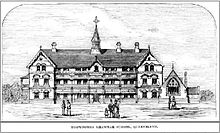|
Grammar Schools Act 1860
 The Grammar Schools Act 1860[1] was passed by Queensland's first parliament in 1860 and allowed for the establishment of a grammar school in any town where £1000 could be raised locally. Between the years 1863 and 1892, ten grammar schools were opened under the auspices of the Act. The first of these was Ipswich Grammar School, which opened in 1863.  History of the ActThe Grammar Schools Act was the fourth bill of the first parliament of Queensland. Along with the Primary Schools Act (Qld) 1860, it aimed to bring Queensland under one general and comprehensive education system without prejudice.  In the early years of Australian education, denominational schools (particularly Anglican schools) had a large influence. By the time of the first parliament of Queensland in 1860, there was a general feeling that any system of education established in Queensland should be free of denominationalism. The Act received little opposition in either House of Parliament – revealing its popularity. It found the approval of the public in general, and even among sections of the Anglican community. The Act marked a departure from the education systems in place in Victoria and New South Wales, where schools were generally tied up with respective religious bodies or (in the case of schools such as Sydney Grammar School) being provided massive, ineffective endowments, with little effort required from the community.   The main points of the Act are summarised below. Basically, the Act allowed for the establishment of a grammar school in any town where £1000 could be raised locally. The Queensland Government then matched that figure. The Schools were to be administered by a seven-member board of trustees, of which four members were appointed by the Governor. The Act also made provision for public scholarships for students to attend university in Britain or the southern states of Australia.  The act was repealed in 1975 and replaced with the Grammar Schools Act 1975. Schools opened under the Act There were ten grammar schools opened under the Act – eight of which remain open today. In chronological order, they were:
When it opened in 1881, Rockhampton Grammar School was co-educational. Only four years later, the board of trustees decided to exclude females from the school, leading to the construction of Rockhampton Girls Grammar School. The latter opened on 11 March 1892 – one day after the official opening of Ipswich Girls Grammar School. (Females were readmitted to Rockhampton Grammar School in 1977 after a 92-year absence). In 1936, hit hard by the effects of the Great Depression, the Maryborough Grammar School and Maryborough Girls Grammar School were forced to close. They were subsequently taken over by the Department of Education, Queensland Government, and renamed the Maryborough State High and Intermediate School for Boys and Maryborough State High and Intermediate School for Girls. In 1974, these schools merged to become the Maryborough State High School. Main points of the actThe main aspects of the act were as follows:
References
|